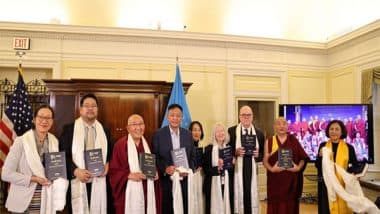Dharamshala (Himachal Pradesh) India, December 16 (ANI): The Central Tibetan Administration (CTA) political leader, Sikyong Penpa Tsering had a series of important engagements in Washington, DC, aimed at strengthening international support for the Tibetan cause and addressing key issues affecting the Tibetan people.
Sikyong had a significant meeting with Richard R Verma, the United States Deputy Secretary for Management and Resources, according to the statement shared by Central Tibetan Administration (CTA).
Verma, who has deep experience in Tibetan affairs from his time as the US Ambassador to India, took a personal interest in the well-being of Tibetan spiritual leader Dalai Lama, particularly following the leader's recent knee surgery. Their discussion underscored the strong ties between the US and Tibetan communities, with Verma demonstrating his continued commitment to Tibetan issues.
This meeting was followed by an hour-long session with Uzra Zeya, the US Under Secretary for Civilian Security, Democracy, and Human Rights, who also serves as the US Special Coordinator for Tibetan Issues.
Sikyong expressed his gratitude to Under Secretary Zeya for her consistent support and dedication to the Tibetan cause. The meeting was attended by Representative Namgyal Choedup, Alison Bartel, Senior Advisor in the Office of the Under Secretary, as well as representatives from the Bureau of Population, Refugees, and Migration (PRM) and the Bureau of Democracy, Human Rights, and Labor (DRL).
Concluding his engagements, Sikyong met with staff members from both the majority and minority parties of the Senate Foreign Relations Committee. This crucial discussion focused on ongoing human rights concerns in Tibet and the broader geopolitical implications of Tibet's struggle for autonomy and cultural preservation.
Sikyong's meetings in Washington, DC exemplified the ongoing diplomatic efforts of the Central Tibetan Administration to advance the Tibetan cause on the global stage. Through these dialogues with U.S. officials and the public, Sikyong continues to advocate for greater international recognition of Tibet's unique cultural and human rights issues.
The Tibet-China conflict, a complex geopolitical dispute, revolves around national sovereignty, human rights, and cultural identity. At its heart lies Tibet's political status, its relationship with China, and the rights of Tibetans under Chinese governance. The issue carries significant historical, cultural, and political implications and continues to attract global attention without resolution. (ANI)
(This is an unedited and auto-generated story from Syndicated News feed, LatestLY Staff may not have modified or edited the content body)













 Quickly
Quickly

















